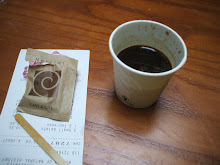As the weekend approached, however, it was going to be one of my first weekends without the kid in a long time, and since so many other things had recently changed in life too, I was a little at sea with what to do with myself. Going out of town wasn't an option with gas as expensive as it is, and working on the house was still presenting an emotional challenge. Cheering on some friends at the Dragon Boat Races seemed like just the thing. Cheering on, I say.
When I arrived, however, Chief Beer Officer An Bui told me to register — in case they needed me. Minutes later, I was needed. Apparently, this had been the plan all along; they just didn't bother to tell me. I grabbed a life jacket and joined the other 20 members of our boat to wait on line.
Dragon boat racing has apparently become a popular fundraiser across the country. The company running the races comes down from Canada, brings the boats, paddles and life jackets, sets up the course, and brings coaches for the competing boats. Teams are formed by companies or groups who pay the entrance fees, much like any other athletic fundraiser. And much like any other athletic fundraiser, a lot of the people who are rowing look like avid athletes. Some even had their own gear and equipment, like paddles in zipped neoprene cases.
The Mekong teams? Not so much. We were a ragtag bunch of beer lovers, artists, beer distributors, musicians, farmers, and various and sundry others. We were the Bad News Bears to the spiffy teams around us. And we were there to have fun.
Dragon boat races are broken into heats of 500 and 1000 meters, and our group was broken in to Teams A and B. The key to moving the boat forward is more in weight distribution and finding a steady rhythm than in power-paddling. Of course, it helps if you have a strong team. Before each race, you have warm-up periods during which the coach and drummer work to find a good sync for the boat.
In the first heat, Team A came in second, and continued to improve through the next couple of races. They won a cup in the umbrella division and didn't lose again until the finals when they were down three people.
On Team B's first race, we lost by more than a boat length. We'd paddled hard, but the drummer and coach were out of sync. Over the next few heats, Team A continued to do well. We improved with a change in drummers — kudos to Rasta Russell whose booming voice and quick wit kept us moving — but we were still lagging in our races.
The final race we rowed was a medal and cup heat for the C Division. As we pulled away, a new coach asked us to show him our "set." The set is the position at which you hold your paddle. He immediately corrected our position so we used our backs more than our arms. Then he asked us to take three strokes. Russell counted off, and we took three strokes. He told us to slow down and get our paddle blades all the way into the water. We tried again, and this time the boat moved differently. The deeper, more measured stroke worked with the boat's natural inertia and propelled us along. We tried a few more times, and each one was better. We whispered to each other about being able to feel the difference.

It was time to line up at the start. We pulled up to the line and awaited the starting horn. When it came, we followed his advice but started behind. Before long though, the rhythm steadied. Little by little, we nosed ahead until before long we were completely into the rhythm, one body working together to steadily propel the long, flat boat. Russell was beating the drum and calling out the count as we moved into the final stretch, and we were all counting with him. Stroke. Stroke. Stroke. Until we crossed the finish line. With one of the best times of the day. A boat length and a half ahead of the second place boat.

From the shore, the rest of the Mekong crew was cheering us on, and shouting "1. 2. 3. Beer!" We were clapping each other on the backs, high-fiving, saying "Can you believe that? That was amazing." And so much more. The Bad News Bears had won the Little League World Series again, and the feeling of being handed those medals was oh-so-sweet. I thought as we were walking up from the dock that it was also the most work I had given my shoulder in more than four years — and it felt good.
I'll puzzle through the metaphors and lessons of all this later, but the victory felt sweet. So, too, did the truly zen feeling of working together and understanding in my tired arms and back the natural momentum of doing something the right way.

